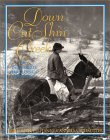 NONFICTION
NONFICTIONDEAR MISS BREED: TRUE STORIES OF THE JAPANESE AMERICAN INCARCERATION DURING WORLD WAR II AND A LIBRARIAN WHO MADE A DIFFERENCE by Joanne Oppenheim (Scholastic)
"Dear Miss Breed, How will I do it? Do what? Why, thank you, of course. For what? For the simply splendid books, naturally. Every single one is almost as dear as you are, but not quite."
After December 7, 1942, over 110,000 Nikkei (Americans of Japanese descent living on the West Coast) were identified as a "threat" to our nation and relocated to designated camps such as Santa Anita, also known as "San Japanita." Miss Breed worked with the San Diego Public Library, and was mortified by the turn of events that made enemies out of citizens. She gave her young patrons self-addressed postcards so that she could keep tabs on their location, and continue to serve them as best as she could. Through letters, supplies and outspoken articles, she offered support to the children and families she served before the war, even sending books so that the children's love of reading could continue in these dire circumstances. The correspondence serves as a remarkable testament to this strange and heartbreaking chapter in American history. An astonishing, even overwhelming amount of research went into this book, including a number of strong images such as the "How to Spot a Jap" instructional cartoon, and an uncomplimentary editorial by Dr. Seuss that serve to illuminate the climate of the time. Though it may be a bit bulky for the average reader, it is sure to raise both the ire and the level of historical knowledge of any justice-seeking middle-schooler, and is an inspiring must-have for background knowledge of any educator.
No matter what position a reader may hold on the subject of war, the effects of xenophobia on the rights we hold dear is a subject worthwhile of discussion and contemplation, lest we be among those who don't know history and are doomed to repeat it. Quotes and reminiscences of the people who lived it are abundant, chilling and provocative. Here are just a few:
"I remembered feeling bad about being Japanese, of being even able to speak Japanese, of having Japanese parents. I felt ashamed because I loved my parents. I also loved America. I get goose bumps when I sing the Star Spangled Banner. I believed what our teacher s taught us about what a great country America is." (Amy Iwasaki Mass)
"...I became suddenly a 'squint-eyed yellow-bellied Jap' to my fourth grade schoolmates, who had formerly been my friends...Nobody in the Government made distinctions between the 'Japs' of the Japanese Imperial Army and me. I was one of the enemy, though ten years old, and placed in a concentration camp." (Robert Moteki)
"[My husband] was just eleven years old at the time...he had to give his dog away. No pets were allowed. They took the dog to its new home, in El Cajon, about twelve miles away. Months later, Joe had learned that the dog had walked all the way home. Finding the family had gone, the dog crawled under the porch and died." (Elizabeth Kikuchi Yamada)
"I was a 12 yera old boy at the time, and I guess that bike was my most prized posession! But I had to leave it behind. I still remember how hard it was to leave that bike of mine...there were two other bikes just lying on the ground with mine as the bus pulled away," (Its Endo)
"I could not take my own small library which was contained in a small apple box...However, Miss Breed became my personal library custodian. I put a lid on the box and she took care of it until I returned to San Diego!" (Tets Hirasaki)
 Also of interest:
Also of interest:GHOST GIRL by Delia Ray (Clarion) Historical fiction based on the true story of a life-changing relationship between an Appalachian girl and a teacher sent to her community by the Hoover administration. (10 and up) Delia Ray is a relatively new writer of unusual sensitivity who deftly handles conflicts between haves and have-nots; check out her latest book about a hearing child with evangelical deaf parents, SINGING HANDS (11 and up).
 DOWN CUT-SHIN CREEK: THE PACK HORSE LIBRARIANS OF KENTUCKY by Kathi Appelt (HarperCollins)Whooooaaa Nelly, these librarians knew how to use what they had to make reading magic happen, traversing hill and vale on horseback to get books into remote regions as part of Roosevelt's WPA program. These brave booklovers are my heroes, and after checking out this well-researched, exciting introduction to their work, they will be yours, too! (8 and up, and a must-have for all grown-ups in the field of reading and children's literature)
DOWN CUT-SHIN CREEK: THE PACK HORSE LIBRARIANS OF KENTUCKY by Kathi Appelt (HarperCollins)Whooooaaa Nelly, these librarians knew how to use what they had to make reading magic happen, traversing hill and vale on horseback to get books into remote regions as part of Roosevelt's WPA program. These brave booklovers are my heroes, and after checking out this well-researched, exciting introduction to their work, they will be yours, too! (8 and up, and a must-have for all grown-ups in the field of reading and children's literature)Links are provided for informational use. Don't forget to support your local bookseller.

No comments:
Post a Comment